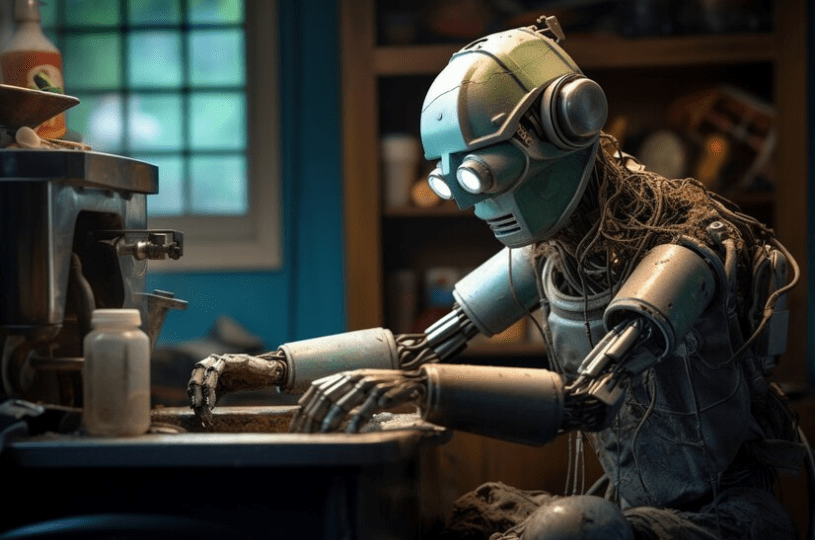
- tecnotales.com
- January 6, 2024
- 1 Comments
Has AI Gone Too Far? Surviving the Edges and Threats of AI Tech?
Artificial Intelligence (AI) has become the backbone of modern technology, transforming industries, reshaping societies, and influencing our daily lives in ways once thought impossible. From voice assistants to self-driving cars, AI systems are pushing the boundaries of what machines can do. Yet, with rapid advancements comes a critical question: Has AI gone too far?
At TecnoTales, we provide insights into emerging technologies, exploring both opportunities and risks. This article dives deep into the edges and threats of AI technology, shedding light on how society can survive, adapt, and thrive in this ever-changing digital era.
The Rise of AI: From Assistants to Autonomous Systems
AI’s journey has been extraordinary. Initially developed for simple pattern recognition and problem-solving, it has now evolved into machine learning, deep learning, and generative AI that can create human-like content.
Voice Assistants: Siri, Alexa, and Google Assistant simplify tasks but also collect vast amounts of personal data.
Autonomous Cars: Vehicles powered by AI promise safer roads but raise ethical dilemmas about accident responsibility.
Healthcare AI: Diagnostic tools can detect diseases faster than doctors but also spark debates about medical ethics.
While these examples highlight progress, they also underline a pressing reality the more powerful AI becomes, the greater the risks of misuse, bias, and loss of control.
Has AI Crossed Ethical Boundaries?
Bias and Discrimination in AI
AI models are trained on human data, which often contains biases. As a result, AI-driven recruitment tools may unintentionally discriminate against certain genders or ethnicities, reinforcing existing inequalities.

Privacy Concerns
Every interaction with AI leaves a digital footprint. From facial recognition to data collection, the technology raises alarms about surveillance and privacy rights. Are we unknowingly giving up too much control?
Weaponization of AI
One of the most alarming edges of AI is its potential use in autonomous weapons systems. Militarized AI could make life-and-death decisions without human oversight—posing a grave threat to humanity.
The Psychological and Social Threats of AI
Job Displacement and Economic Impact
AI-powered automation is eliminating traditional jobs across industries like manufacturing, transportation, and even creative sectors. While AI creates new opportunities, millions face economic displacement.
Mental Health Challenges
The rise of AI chatbots, virtual companions, and deepfake content can blur the line between reality and illusion. Over-reliance on AI may lead to isolation, addiction, or reduced human interaction, affecting mental health.
Erosion of Trust in Information
Generative AI can create realistic fake news, manipulated videos, and synthetic voices. This misinformation threatens democracy, security, and the very concept of truth.
The Future of AI: Where Do We Draw the Line?
AI is not inherently good or bad it is a tool shaped by human intention. The real question isn’t whether AI has gone too far, but whether we as humans are prepared to handle the consequences.
If left unchecked, AI may deepen inequalities, threaten democracy, and compromise human identity. But if guided wisely, it could usher in an era of prosperity, innovation, and unprecedented progress.
At TecnoTales, we believe the future lies in responsible AI development, where humans remain at the center of decision-making.

Final Words:
So, has AI gone too far? The truth is, we stand at a crossroads. The edges and threats of AI are real, but so are the opportunities. It’s not about rejecting technology, but about learning to survive and thrive alongside it.
At TecnoTales, our mission is to provide information that empowers you to understand the risks and possibilities of AI. The future of AI depends not only on technology itself but also on how we, as a society, choose to shape it.
FAQs
1. Has AI really gone too far?
AI has advanced rapidly, raising concerns about privacy, job loss, and ethical dilemmas. Whether it has gone too far depends on how society manages its use.
2. What are the biggest threats of AI technology?
The main threats include bias in decision-making, surveillance, autonomous weapons, misinformation, and job displacement.
3. How can we survive AI-driven changes?
By upskilling, embracing ethical AI, supporting regulations, and protecting personal data, individuals and societies can adapt to AI’s growth.
4. Can AI completely replace humans?
AI can automate many tasks, but human creativity, empathy, and moral judgment cannot be fully replicated by machines.
5. What role does regulation play in AI safety?
Regulations ensure transparency, accountability, and ethical standards, preventing the misuse of AI technology.
1 Comment
tecnotales.com
September 3, 2025hello